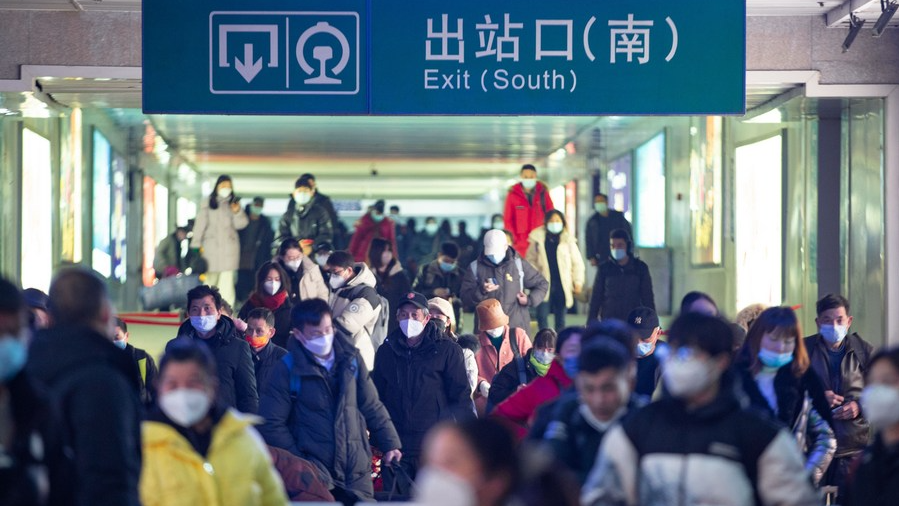
Consumers go shopping at a shopping mall in Kunming, southwest China's Yunnan Province, January 1, 2023. /Xinhua
Consumers go shopping at a shopping mall in Kunming, southwest China's Yunnan Province, January 1, 2023. /Xinhua
Editor's note: Chen Jiahe is the chief investment officer at Novem Arcae Technologies. The article reflects the author's opinions and not necessarily the views of CGTN.
In the year 2023, China's economy is expected to give strong support to the global economy, after the country's three years' battle against the COVID-19 pandemic. Meanwhile, within the various economic sectors of the economy, the consumption is likely to deliver the most crucial support to China's economy this year.
After China has optimized its COVID-19 response in late 2022, the Chinese economy is growing at a rapid pace. The latest purchasing managers' index (PMI) figure reached 50.1 in January, 3.1 higher than the last record.
In anticipation of Chinese economic growth, the stock market has responded positively since October 2022. The Shanghai and Shenzhen 300 Index increased from the trough of around 3,500 points in last October points to around 4,000 points in early February this year. The Heng Seng Index showed an even stronger rebound: It rebounded by around 45 percent within just three months' time.
The strong economic growth of the country offers strong support to the sluggish global economic growth forecast for 2023. With the projection from the International Monetary Fund (IMF), the economic growth rate of the world is estimated to be 2.9 percent in 2023. Although this figure is already 0.2 percent increase from the forecast made in last October, it is well below the growth rate of 2022, which was 3.4 percent.
There are a few reasons behind this sluggish global economic growth rate. The first problem stems from unstable economic conditions in North America and Europe, where a higher rate of inflation has led to slowdown of economic growth. This dilemma poses a challenge to central banks. Adopting a stringent monetary policy and raising interest rate will result in slower growth, while adopting a loose monetary policy will result in an inflationary status that is also unwanted.
Meanwhile, the Russia-Ukraine conflict is still pushing up global food and energy prices. Furthermore, the shadow of the COVID-19 remains. New variants of the virus might still be discovered. Therefore, the public health sectors of the world must prepare themselves for the potential threat.
At this critical moment, a stable and robust Chinese economy is much more important to the world. In 2021, China's economy accounts for 18 percent of the world, increased from 11.4 percent in 2012. With almost one-fifth of the global economic share, the prosperity of China's economy brings a silver lining to the world.

Travelers walk out of Nanjing Railway Station in Nanjing, capital of east China's Jiangsu Province, January 2, 2023. /Xinhua
Travelers walk out of Nanjing Railway Station in Nanjing, capital of east China's Jiangsu Province, January 2, 2023. /Xinhua
Additionally, as China is one of the world's most important trading nations and China's imports and exports with such a large volume, therefore the prosperity of the Chinese economy does not bring economic progress for China alone. With its countless links with hundreds of economies in the world, the economic stability and development of China can bring much more spill over effect to many other countries.
Within the Chinese economy, there are three important economic sectors: investment, global trade, and domestic consumption. Within which, the consumption is considered as capable of providing the largest support in this year.
China's investment in its infrastructures, including projects such as high speed railroad, airport, watering facilities, hydropower stations, and energy storage systems, have provided strong support for the Chinese economy in the years between 2020 and 2022, when China was battling against the rampant COVID-19 pandemic. However, with the easing of the pandemic situation, as well as the completion of many investment projects, the investment sector will not be the dominant economic sector in 2023.
Apart from investments, the international trade, which is also one of the three largest sectors of China's economy, is expected to face a number of challenges this year.
On the one hand, the sluggish economies of Europe and North America might bring down Chinese exports' growth. On the other hand, the strong economic growth of Asian economies, such as the ASEAN economies, will deliver a positive impact to Chinese exports. The trade between China and Africa is also expected to grow. So take all these together, the international trade of China will generate a very uncertain influence to the Chinese economy: Its influence can be either positive or negative.
Finally, the consumption is the biggest driver for China's economic growth this year. After the optimization of COVID-19 response in the end of 2022, China's consumption soon rebounded, after the first wave of Omicron passed away.
Sub consumption sectors such as shopping, restaurant, short and long distance tourism, travelling, have all rebounded at a rapid speed. As this year's Spring Festival has just passed, the number of tourists travelling across the country has rebounded to nearly the level in 2019, before the COVID-19 pandemic.
(If you want to contribute and have specific expertise, please contact us at opinions@cgtn.com. Follow @thouse_opinions on Twitter to discover the latest commentaries in the CGTN Opinion Section.)